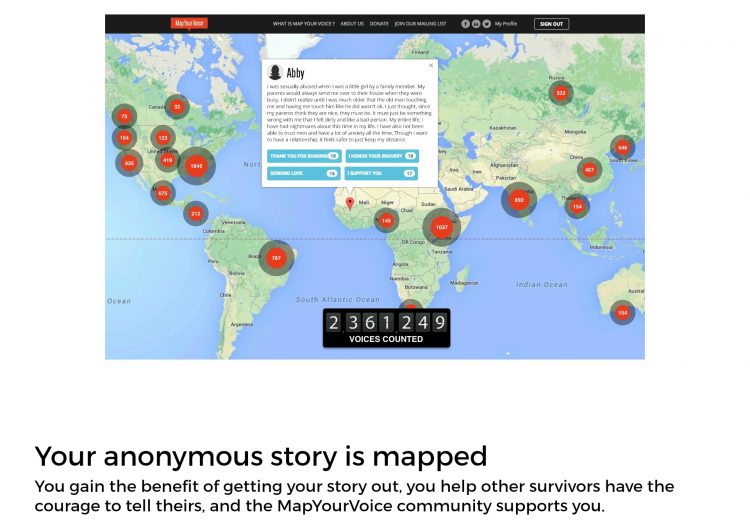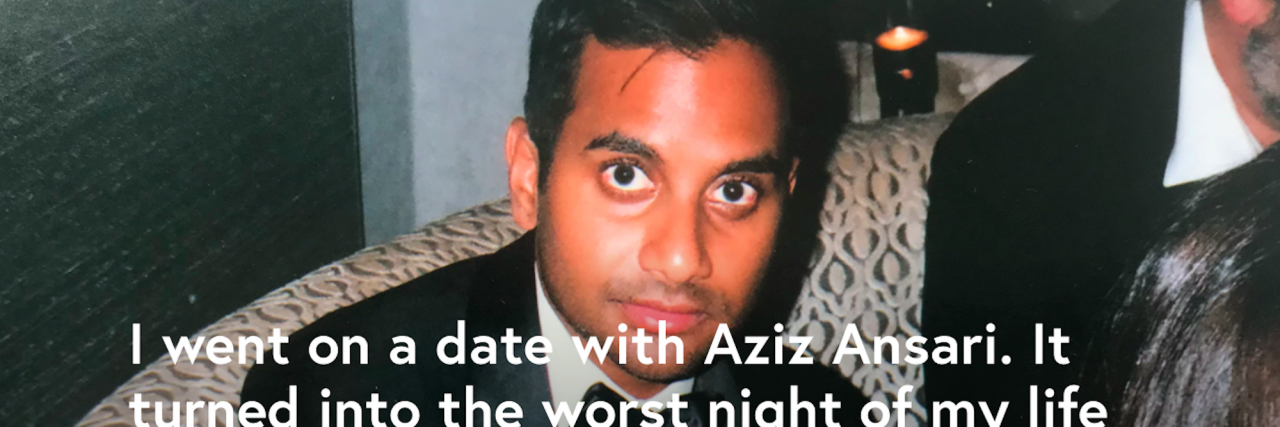Sexual Assault Survivors Deserve Better Than Babe's Coverage of the Aziz Ansari Allegation
Sometimes the news isn’t as straightforward as it’s made to seem. Juliette Virzi, The Mighty’s associate mental heath editor, explains what to keep in mind if you see this topic or similar stories in your newsfeed. This is The Mighty Takeaway.
Editor’s Note: If you’ve experienced sexual abuse or assault, the following post could be potentially triggering. You can contact the National Sexual Assault Telephone Hotline at 1-800-656-4673.
“Babe is for girls who don’t give a fuck.”
This is the manifesto of the publication, babe, now infamous for breaking the story about the Aziz Ansari sexual assault allegations on Saturday, January 13. According to the report, Ansari coerced a 23-year old woman — referred to anonymously as “Grace,” — into engaging sexually with him.
I’m sorry babe, but when it comes to sensitive topics like sexual assault, we need to “give a fuck.”
Since news broke, the once-unknown publication has been thrust into mainstream media dialogue, drawing criticism for the way it handled the story. Aside from unnecessary editorializing (“She showed me a picture, it was a good outfit”), the outlining of every sexual encounter in painstaking detail goes against the Dart Center for Journalism and Trauma’s guidelines for reporting on sexual violence, advising against gratuitous use of graphic language.
The story is not simply “3000 words of revenge porn” as Caitlin Flanagan of The Atlantic wrote. It’s triggering, and sexual assault survivors deserve better. In a piece appropriately titled, “Babe, What Are You Doing?,” Jezebel Culture Editor Julianne Escobedo Shepherd wrote:
Reporting on sexual violence and misconduct is an incredibly delicate undertaking that requires a working understanding about how best to do it. At its most basic level, this means that reporters must be careful not to re-traumatize subjects, which includes consideration of the ways that their reports will be received—that is, often with skepticism and disbelief… Because of the amateurish way the Babe report was handled… it left the subject open to further attacks, the kind that are entirely, exhaustingly predictable.
Not only did the piece give no content warning of the graphic details to follow, the informal personal essay style made the story appear like a juicy piece of gossip, rather than a survivor’s account of sexual trauma. What’s more, the way babe has handled the ensuing media firestorm has been, in a word, gross.
On Wednesday, Katie Way, the author of the controversial article responded to one of her outspoken critics, HLN anchor Ashleigh Banfield, via an inflammatory email. On her show on Tuesday, Banfield read part of the email aloud, (you can read it in full here).
Ashleigh (?), someone I’m certain no one under the age of 45 has ever heard of, by the way, ripped into my source directly was one of the lowest, most despicable things I’ve ever seen in my entire life. Shame on her… I hope the ratings were worth it! I hope the ~500 RTs on the single news write-up made that burgundy lipstick bad highlights second-wave feminist has-been feel really relevant for a little while.
Not only was the email blatantly unprofessional, it seemed to go against the ideals of feminism babe touted in publishing Grace’s story in the first place. One Twitter user wrote, “Babe dot net and Katie Way are giving a masterclass in how not to handle sensitive stories right now. Grace deserves better. All survivors do.”
Babe dot net and Katie Way are giving a masterclass in how not to handle sensitive stories right now. Grace deserves better. All survivors do.
— Britni de la Cretaz (@britnidlc) January 17, 2018
But perhaps worst of all was the listicle babe published, originally entitled, “Just a whole bunch of places who picked up our Aziz story,” which was — I kid you not — a list of links to the different publications that covered the story. The lead quote was even, “What the fuck is babe dot net?”
Not only is this self-congratulatory, pat yourself on the back attitude completely inappropriate, the headline tells us what we need to know — babe viewed it as their story, not Grace’s. The title of this piece was later changed to, “A list of outlets who picked up Grace’s story.”
Is babe dot net even vaguely aware that the one thing all of these pieces had in common is disappointment with how babe dot net handled this? pic.twitter.com/58LqGvHIr1
— Joe Berkowitz (@JoeBerkowitz) January 17, 2018
So where does this leave us?
We can’t take back how this story was reported, but we can make our best effort to support sexual assault survivors in the wake of this news. Here are some things to remember if the way this story was reported — and the conversations it led to — is hard for you.
1. Your experience matters — even if it’s not “legally” considered assault.
“Behavior need not fall under the legal definition of sexual assault or rape to be wrong or violating or upsetting. And when nearly every woman… [has] a similar story of her own, it’s worth thinking about why that is.” https://t.co/wdY3iJItcj
— Anna Boudinot (@annaboudinot) January 17, 2018
In the midst of articles implying Grace’s story is an insult to the #MeToo movement, it may be easy to think, If Grace’s story wasn’t taken seriously, why would mine be?
The fact that there has been debate about whether or not Grace’s story was “actually” sexual assault perpetuates the harmful idea that sexual assault has to be “bad enough” for it to be taken seriously. This couldn’t be further from the truth. No matter what you decide to share (or not share), remember that no matter what anyone says, you and your story are important.
2. Consent is affirmative, ongoing, enthusiastic and yes, can be revoked at any time.
Hot Sex Tip: If she is sending you Mixed Signals, and some of the signals are "I am scared and sad about this sex," stop.
— Melinda Taub (@MelindaTaub) January 14, 2018
No one should ever perform actions or pressure you to do something you are not OK with, period. Not only does a sexual partner need to respect that “no mean no,” they need to be in tune with your needs, instead of solely seeking personal gratification above all else. If a sexual encounter makes you uncomfortable, don’t let anyone dismiss it and chalk it up to being “bad sex” — your feelings are real and valid.
3. It’s OK to take a break from the news.
Uhhhh just so everyone knows: the Aziz Ansari sexual assault story that just came out is incredibly graphic, and really needs a tw/cw. If you’re a survivor, please be careful reading it.
— princess mizzy ???? (@hellomizzyy) January 14, 2018
If the recent onslaught of sexual assault news has been hard for you, please, take a step back. Don’t check the news, and do something to take care of yourself. You can even recruit a friend to filter through the news and keep you updated on a “need-to-know” basis. Don’t feel guilty for unplugging if that’s what you need to do.
And remember, if you’re struggling, there are resources available to you. If you need someone to talk to right now, RAINN, the Rape, Abuse & Incest National Network is the nation’s largest anti-sexual violence organization and has a host of resources available on their website. The organization provides a free, confidential phone hotline at 1-800-656-4673, and an online hotline you can use to chat live with a trained staff member.
4. You can share your story in a way that protects you.
I had dinner with a woman who told me a brutal story about being coerced into sex by a very famous guy. Awful. After seeing how the woman who spoke out about Ansari is being treated, she decided not to share her story publicly.
Let this lose you some sleep tonight, Twitter.
— Amber Tamblyn (@ambertamblyn) January 18, 2018
If you have been wanting to open up about an experience of sexual assault or violence, but are now reconsidering because of this news, please know you are not alone.
MapYourVoice is a resource devoted to helping survivors reclaim their voice in a confidential, safe and supportive way. By creating a free, private account, users are able to safely share their experience via an “assault report” questionnaire. The resource then places your story on a map in your general area where you can then find local resources.

5. You deserve support.
Don’t let the conversations about sexual assault stop when #MeToo stops being talked about by the media. If you are struggling, talk about it — with a friend, professional or hotline attendant — you deserve support for what you went through.
No sexual assault story should be about getting “clicks” or stirring up the gossip mill. Sexual assault survivors and their stories deserve to be treated with respect and compassion. Anything less is simply unacceptable.
If you or a loved one is affected by sexual abuse or assault and need help, call the National Sexual Assault Telephone Hotline at 1-800-656-4673 to be connected with a trained staff member from a sexual assault service provider in your area.
Screenshot via babe.net

